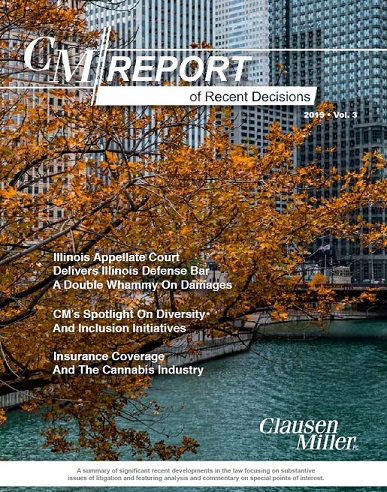CM Report of Recent Decisions – 2019 Volume 3

Spotlight On Clausen Miller’s Diversity And Inclusion Initiatives
Clausen Miller’s Board of Directors is doubling down on its commitment to advance the diversity and inclusion values of the firm. The Board recently announced the goal that by 2021, CM will enjoy a deserved national reputation as a firm devoted to diversity and inclusion, earned by recognized improvements in every rank and category of the firm. While CM has long been committed, and significant progress has been made, CM is striving to move the needle more.
Property Policy Covers Replacing Undamaged Siding To Achieve Matching
In a recent case, Windridge of Naperville Condo Ass’n v. Phila. Indem. Ins. Co., 932 F.3d 1035 (7th Cir. 2019), the Seventh Circuit held that, under the facts presented, a property policy covered the cost to replace elevations of aluminum siding at a condominium complex, which were not damaged by hail or wind, to achieve aesthetic matching. Clausen Miller represented the insurer, Philadelphia Indemnity Insurance Company.
10th Circuit Affirms No Coverage For Fraudulent Wine Purchases Under “Private Collections” Policy
We previously reported on Hasan v. AIG Property Casualty Co., 1:16-cv-
02963-RM-MLC (D. Colo. Aug. 2, 2018) (see 2018 CM Report, Volume 3). Serving as coverage counsel, Clausen Miller partners Dennis Fitzpatrick and Erin Pellegrino correctly advised AIG that there was no coverage for the insureds’ claimed economic loss under these circumstances. The federal district court agreed, granting summary judgment to AIG on all claims and denying plaintiffs’ motion for leave to file an amended complaint. The Tenth Circuit recently affirmed.
California Supreme Court Holds That Notice-Prejudice Rule Applies To First-Party Coverage, But Not Third-Party Coverage
In Pitzer College v. Indian Harbor Ins. Co., S239510, 2019 Cal. LEXIS 6240, the Supreme Court of California held that (1) California’s notice prejudice rule is a fundamental public policy of California; and (2) the notice-prejudice rule generally applies to consent provisions in first party policies, but does not apply to consent provisions in third party liability policies.
Estoppel Doesn’t Apply Where Insurer Is Not Controlling Defense
In Illinois, as in most states, an insurer may be obligated to defend or participate in the defense of an insured even though the insurer believes that the policy does not cover the claim asserted against the insured. In such cases, the insurer may undertake its defense obligations accompanied by issuance of a reservation of rights. If the insurer defends without issuing a reservation, it stands the risk of being estopped from later denying coverage.
Insurance Coverage And The Cannabis Industry
The cannabis industry is expanding rapidly in the United States, even in the face of contradictory legal status on the federal level and among the fifty states. With limited exceptions, the cultivation, use, sale and possession of cannabis remains illegal under federal law, but more than two-thirds of states have legalized cannabis in some form. Legal sales of cannabis-related products are anticipated to exceed $20 billion nationwide by the early part of the next decade.
California Appellate Court Specifies Landowners’ Duty Of Care In Premises Liability Case
In Jones v. Awad, No. F077359, 2019 Cal. App. LEXIS 881 (Cal.App.5th), California’s Fifth Appellate District provided a nuanced analysis of issues related to premises liability actions. In affirming summary judgment in favor of the defendant landowners, the appellate court illustrated some of the subtleties of the “open and obvious” exception to a landowner’s duty of care
 Melinda S. Kollross
Melinda S. Kollross Private: Edward M. Kay
Private: Edward M. Kay Joseph J. Ferrini
Joseph J. Ferrini Private: James R. Swinehart
Private: James R. Swinehart Private: Henry T.M. LeFevre-Snee
Private: Henry T.M. LeFevre-Snee Don R. Sampen
Don R. Sampen Tyler M. Costanzo
Tyler M. Costanzo